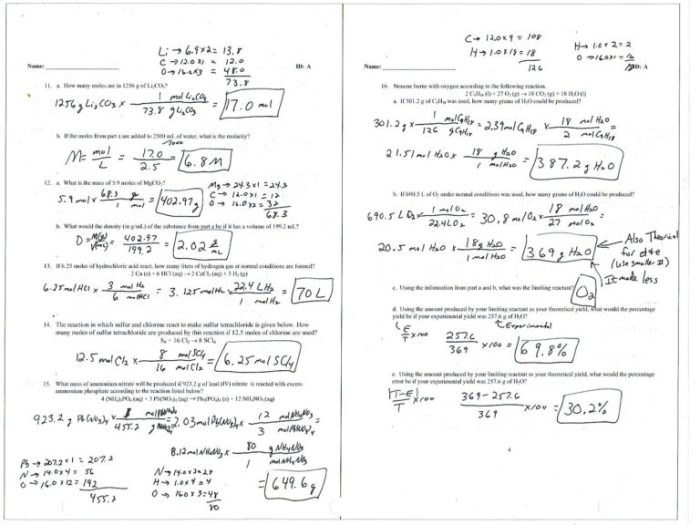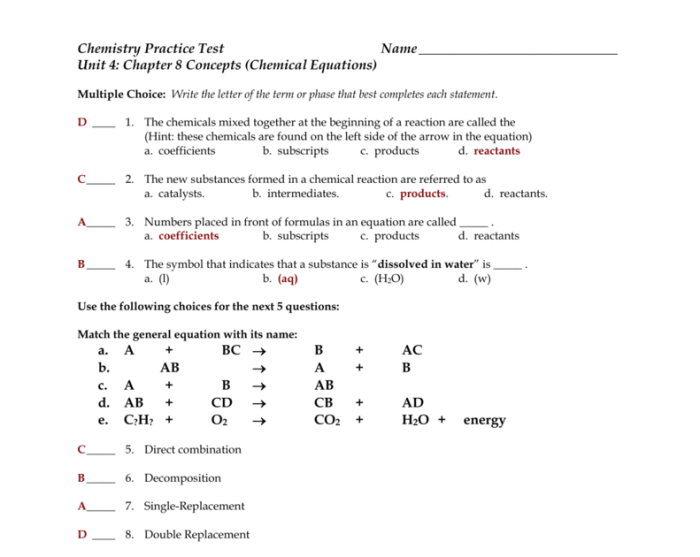The Chemistry Unit 1 Review Answer Key provides a comprehensive overview of the fundamental principles of chemistry, offering students a valuable resource for understanding the building blocks of matter and the interactions between them.
This review guide covers a wide range of topics, including atomic structure, the periodic table, chemical bonding, chemical reactions, stoichiometry, states of matter, solutions, acids, bases, pH, gases, and gas laws. With clear explanations, detailed examples, and practice problems, this answer key helps students master the foundational concepts of chemistry and prepare for success in their studies.
Understanding Basic Chemistry Concepts: Chemistry Unit 1 Review Answer Key

Chemistry is the study of matter and its properties, as well as the changes it undergoes. The fundamental principles of chemistry include the structure of atoms and molecules, the periodic table, and chemical bonding.
The Structure of Atoms and Molecules
Atoms are the basic building blocks of matter. They are composed of a nucleus, which contains protons and neutrons, and electrons, which orbit the nucleus. Molecules are formed when atoms bond together.
The Periodic Table
The periodic table is a tabular arrangement of the chemical elements. It is organized by atomic number, which is the number of protons in the nucleus. The periodic table can be used to predict the properties of elements and to identify trends in their behavior.
Chemical Bonding
Chemical bonding is the force that holds atoms together to form molecules. There are three main types of chemical bonds: ionic bonds, covalent bonds, and metallic bonds.
Chemical Reactions and Stoichiometry
Chemical reactions are processes in which one or more substances, called reactants, are transformed into one or more different substances, called products. Stoichiometry is the study of the quantitative relationships between reactants and products in chemical reactions.
Types of Chemical Reactions
There are many different types of chemical reactions, including synthesis reactions, decomposition reactions, single displacement reactions, double displacement reactions, and combustion reactions.
Stoichiometry
Stoichiometry is used to balance chemical equations, which show the relative amounts of reactants and products in a chemical reaction. Stoichiometry can also be used to calculate the limiting reactant and theoretical yield in a chemical reaction.
States of Matter and Solutions
Matter can exist in three states: solid, liquid, and gas. The state of matter of a substance depends on its temperature and pressure.
Solubility
Solubility is the ability of a substance to dissolve in a solvent. The solubility of a substance depends on the nature of the substance and the solvent.
Colligative Properties, Chemistry unit 1 review answer key
Colligative properties are properties of solutions that depend on the concentration of the solution. Colligative properties include boiling point elevation, freezing point depression, and osmotic pressure.
Acids, Bases, and pH
Acids and bases are two important classes of chemical compounds. Acids are substances that donate protons, while bases are substances that accept protons.
pH
pH is a measure of the acidity or basicity of a solution. The pH scale ranges from 0 to 14, with 0 being the most acidic and 14 being the most basic.
Properties of Acids and Bases
Acids and bases have many important properties. Acids are corrosive and can react with metals to produce hydrogen gas. Bases are slippery and can react with acids to produce salts.
Gases and Gas Laws

Gases are substances that have no definite shape or volume. They are composed of tiny particles that are in constant motion.
Kinetic Molecular Theory
The kinetic molecular theory is a model that explains the behavior of gases. The kinetic molecular theory states that gas particles are in constant motion and that the average kinetic energy of the gas particles is proportional to the absolute temperature of the gas.
Ideal Gas Law
The ideal gas law is a mathematical equation that describes the relationship between the pressure, volume, temperature, and number of moles of a gas. The ideal gas law can be used to solve problems involving gases.
FAQs
What topics are covered in the Chemistry Unit 1 Review Answer Key?
The Chemistry Unit 1 Review Answer Key covers a wide range of topics, including atomic structure, the periodic table, chemical bonding, chemical reactions, stoichiometry, states of matter, solutions, acids, bases, pH, gases, and gas laws.
How can I use the Chemistry Unit 1 Review Answer Key to improve my understanding of chemistry?
The Chemistry Unit 1 Review Answer Key can be used as a study guide to reinforce your understanding of the material covered in class. It provides clear explanations, detailed examples, and practice problems to help you master the foundational concepts of chemistry.
Is the Chemistry Unit 1 Review Answer Key suitable for all levels of chemistry students?
Yes, the Chemistry Unit 1 Review Answer Key is suitable for students at all levels, from beginners to advanced learners. It provides a comprehensive overview of the fundamental principles of chemistry and can be used as a valuable resource for students seeking to improve their understanding of the subject.